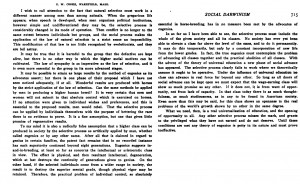Alexis Carrel, Nobel Prize Winner. Man the Unknown, 1939. [Source] […] A man’s value depends on his capacity to face adverse situations rapidly and without effort. Such alertness is attained by building up many kinds of reflexes and instinctive reactions. The younger the individual, the easier is the establishment of reflexes. A child can accumulate …
Category: education
Carrel: eugenics asks for the sacrifice of many individuals.
Alexis Carrel, Nobel Prize Winner. Man the Unknown, 1939. [Source] A choice must be made among the multitude of civilized human beings. We have mentioned that natural selection has not played its part for a long while. That many inferior individuals have been conserved through the efforts of hygiene and medicine. But we cannot prevent …
“Strategic Planning for Mental Health” by J. R. Rees, 1940
Strategic Planning for Mental Health By Colonel J. R. (John Rawlings) Rees, M.D. [SOURCE: mental-health-vol-1-no-4-october-1940] Summary of an address given at the Annual Meeting of the National Council for Mental Hygiene on June 18th, 1940. By Colonel J. R. Rees, M.D. It would be hard to imagine a time more unusual or more trying than …
Eugenics as a Religion and Social Darwinism, Collin Wells
Source: Dr. Collin Wells, “Social Darwinism” a paper presented in 1907, found in The American Journal of Sociology, pages 706-709 Finally, what is the evolutionary value of certain ideals? Let us take individualism, the ideal of democracy, which has tacitly figured in many of the phenomena to which I have already referred. Let us go …
Child Labor Laws as Eugenics Policy
Source: Dr. Frank a Fetter, Cornell University, in a discussion of “Western Civilization and the Birth-Rate”, as found in The American Journal of Sociology, 1907, page 619. The paper mentions but one recent social change which tends definitely and positively to reduce the families of the unskilled classes, namely, child-labor legislation. Such laws as these …
Universal Education a Pre-Requisite for Effective Eugenics Policies
Source: G.W. Cooke, discussing ‘Social Darwinism’ in American Journal of Sociology 12 (March 1907), 714-715. Below the image is OCR scanned text. If anyone would like to send a cleaned edition, that would be greatly appreciated. I wish to call attention to the fact that natural selection must work in a different manner among men …
Sterilization Like Vaccination!
The argument that compulsory sterilization was justified on the same grounds as compulsory vaccination was common, and eventually won Supreme Court Sanction in Buck vs. Bell. Source: “Sterilization: A Progressive Measure?” In Wisconsin Magazine of History, Spring of 1960, wisconsin-sterilization-progressives-21585 As Dr. T.W. Williams of Milwaukee wrote, the fate of the present [compulsory sterilization] bill …
Scientific American: “The Science of Breeding Better Men” 1911
Editorial from a 1911 edition of Scientific American [Source]: Sci-Am’s Editor’s note: This editorial was written and published in 1911. Although our editors of a century ago pondered some lofty aspirations for the orderly future of humans, it was only three decades later that the brutal reality of a Nazi social order suffused with a …
The Jaffe Memo and Eugenics
After World War 2, it became unwise to advocate for eugenics openly. However, since eugenicists believed that they were only extending scientific principles, and felt that they stood on the bedrock of Darwinian truth, they could not just abandon the program. They explicitly took to covert means of advancing their agenda, and, deprived of coercive …
Julian Huxley: Population Control, Eugenics, and Birth Control all part of the same Program
Contemporary advocates for birth control exhibit no awareness whatsoever that birth control was always conceived in the context of ‘eliminating the unfit,’ ie., eugenics. Eugenics, in turn, was considered a straight-forward logical extension of Darwinism. Eugenics was seen as human control of human evolution, and was always tied into discussions on ‘population control.’ These are …



Recent Comments